November 28, 2021
10:21 P.M. EST: While Libre Party supporters, and opponents of the governing National Party, celebrate, many observers are still voicing caution. While Castro’s lead in the preliminary results appears decisive, if indeed the 16 percent sample is representative of the total vote, it is worth remembering that early results in 2017 also gave the opposition a significant (although much smaller) lead. As our own Alex Main summarized:
After a long, unexplained delay, the TSE announced that Salvador Nasralla ― candidate of the Opposition Alliance Against the Dictatorship ― was in the lead by 5 points with 57 percent of votes counted. But then the electronic vote count was delayed for more than 30 hours. Over the following days, additional “technical failures” occurred. When the count resumed, Nasralla’s lead gradually evaporated and, by late in the day on November 30, Hernández was ahead by 1.5 percentage points.
Considering this precedent, as well as the many irregularities witnessed today (which we have attempted to document on this blog), continued scrutiny of the tabulation process and the official results is warranted. And irregularities should be investigated by credible authorities.
9:52 EST: Announcing preliminary results based on 2,929 presidential actas that comprise 16.01 percent of the total (18,293), the CNE says Libre Party candidate Xiomara Castro obtained 53.4 percent of the vote, with National Party candidate Nasry Asfura second with 34 percent, and Liberal Party candidate Yani Rosenthal third with 9 percent.
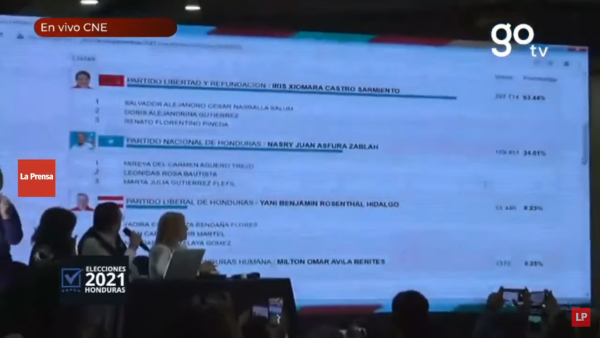
9:38 P.M. EST: CNE President Kelvin Aguirre announced that over 3 million Honduras voted, meaning voter participation of about 62 percent. Watch the CNE press conference underway here.
9:16 P.M. EST: An exit poll from CESPAD, and another reported by right-wing outlet La Tribuna, give Xiomara Castro a decisive lead.
8:38 P.M. EST: Scattered reports of ongoing Libre presence at voting centers, and diminishing National Party presence, continue. The CNE is supposed to announce preliminary results at 8:00 p.m. Honduras time (9:00 p.m. EST).
CORRECTION: 8:26 P.M. EST: Honduras Now reported how the disenfranchisement and chaos at [one JRV] at the Escuela Republica de Panamá in Buenos Aires, Tegucigalpa concluded:
What ended up happening: National party table President blocked all voters standing in line from getting into vote. He created a one hour scandal, waited until after 6, people that didn’t vote left, & the table began vote counting process #HondurasElections
— Honduras Now (@HondurasNow) November 29, 2021
8:15 P.M. EST: Election observer Burke Bindbeutel sends this photo of presidential ballot counting at the Escuela Republica de Panamá in Buenos Aires, Tegucigalpa. Many voters there reportedly were unable to cast ballots today (see below).
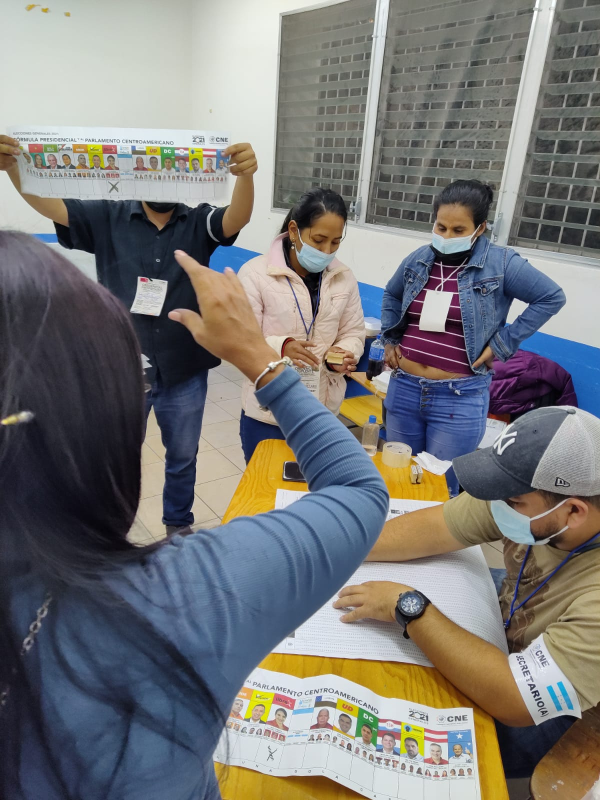
7:59 P.M. EST: The US government-funded non-profit organization Association for a More Just Society has told the media it too is concerned by many irregularities today, including that people with invalid identity cards being allowed to vote, ballots lacking stamps put in ballot boxes, and “non-application of indelible ink to voters or inclusion of deceased persons in the electoral roll.”
7:49 P.M. EST: Honduran national and well-known professor Suyapa Portillo Tweeted earlier this evening that voting was “non-operational” at the consulate in Los Angeles, CA, another example of impediments to voting in the US (see below).
7:37 P.M. EST: An election observer at Instituto España Jesus Milla Silva in Colonia Kennedy, Tegucigalpa reports “Crowds rush the polling site after an onlooker says they saw a stack of IDs during the vote count.”
7:26 P.M. EST: Manuel Zelaya, former president and possibly future first gentleman, announced earlier that the Opposition Alliance will hold a press conference at 8:00 p.m. Honduras time, the same time the CNE is expected to make its first statements after the conclusion of the election.
7:18 P.M. EST: Honduras Now reports:
Still no TREP [preliminary] results being sent in. CNE will make first announcement allegedly at 8 pm but here in Buenas Aires, vote counting hasn’t started & voters are still fighting with voting table representatives about voting being closed early. https://t.co/dbdyQtfs6x
— Honduras Now (@HondurasNow) November 29, 2021
7:15 P.M. EST: An election observer at the CEB Monseñor Jacobo Cáceres in Suyapa, Tegucigalpa reports they are “In a vote count preceding calmly and orderly. The public is standing outside the classroom and watching through the windows as the JRV LIBRE and PN members each look at hold up the ballot for the people outside to see.”
6:19 P.M. EST: The PJE and CESPAD have issued a new alert denouncing obstruction of the voting center at the Escuela Republica de Panamá, Buenos Aires, Tegucigalpa, and apparent conflict between electoral authorities and voters there (see below).
6:12 P.M. EST: Election observers documented the lack of accessibility for disabled people to vote at the Escuela Republica de Panamá, Buenos Aires, Tegucigalpa.
6:07 P.M. EST: Honduran media reported at 6:00 ET that CNE president Kelvin Aguirre said voting will be extended for an extra hour at voting centers where there is unanimous agreement.
5:59 P.M. EST: As voting centers prepare to close, election observers talk to media.
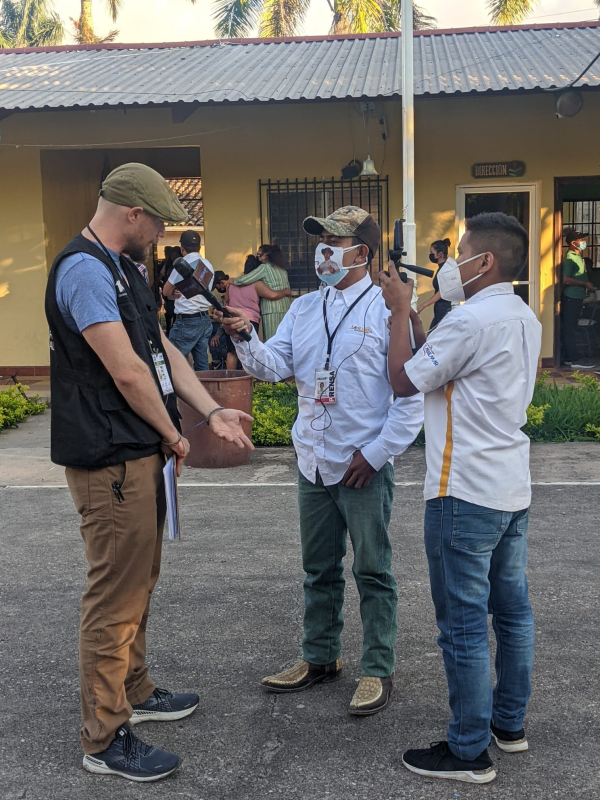
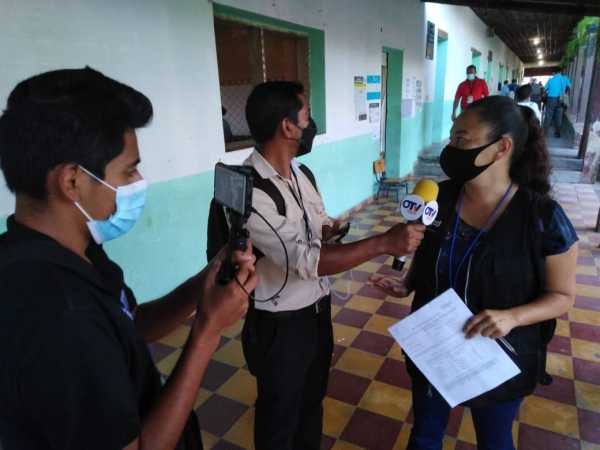
5:42 P.M. EST: The CNE statement denouncing an attack on its web server also calls on candidates and media to abstain from publicly (and illegally) declaring victory or other information about election results, in an apparent reference to the National Party press conference earlier today. The CNE also said that voting should be extended so that the last person still in line will be able to vote, in accordance with Article 265 of the Electoral Law, and that the fingerprint registry shows that 36 percent of eligible voters came out to vote today.
5:19 P.M. EST: Contra Corriente’s Jennifer Avila reported at 4:55 p.m. that the CNE claimed there had been an attack on its web server. The site has been offline throughout the day (see below).
5:16 P.M. EST: An election observer reports: “Ruinas Copan 2801: One hour before closing time. Just over 2/3 of the possible votes are in. Things have pretty much ground to a halt. There are no people outside waiting to vote.”
5:15 P.M. EST: National Party leader Fernando Aduray is blaming alleged incidents of “violence” and disorder on the Libre Party, whom he said want to “generate chaos and anarchy” after learning of the adverse primary results at noon” [presumably the National Party’s much-condemned televised press conference declaring victory]. Aduray also linked the Libre Party with “communism in Venezuela and the Sao Paulo Forum.”
5:05 P.M. EST: The PJE and CESPAD have issued a statement denouncing the “threat of fraud” in public statements made by David Chávez, of the central committee of the National Party, declaring victory before voting has concluded. (See below.)
5:00 P.M. EST: Honduran newspaper El País reports “Problems with some people who are not on the voting lists at the Paz Barahona School in San Pedro Sula.”
4:40 P.M. EST: Election observers at a voting center in in Buenos Aires, Tegucigalpa documented the tense scene outside as party representatives worked to determine a more efficient system to allow the many people waiting, for hours, outside, to vote, while inside there are reportedly JRVs with few voters waiting.
4:30 P.M. EST: Just before 4:00 EST, Nuestra Red and Global Exchange, which both have many observers on the ground in Honduras today, denounced the “buying and selling [of] votes in the department of Francisco Morazán through tickets issued by political activists.”
3:57 P.M. EST: An election observer in Buenos Aires, Tegucigalpa, reports: “Allegations at the Buenos Aires voting center that there is a guy in a blue hat (with a B on it) collaborating with police to only let in people voting for the Partido Nacional.”
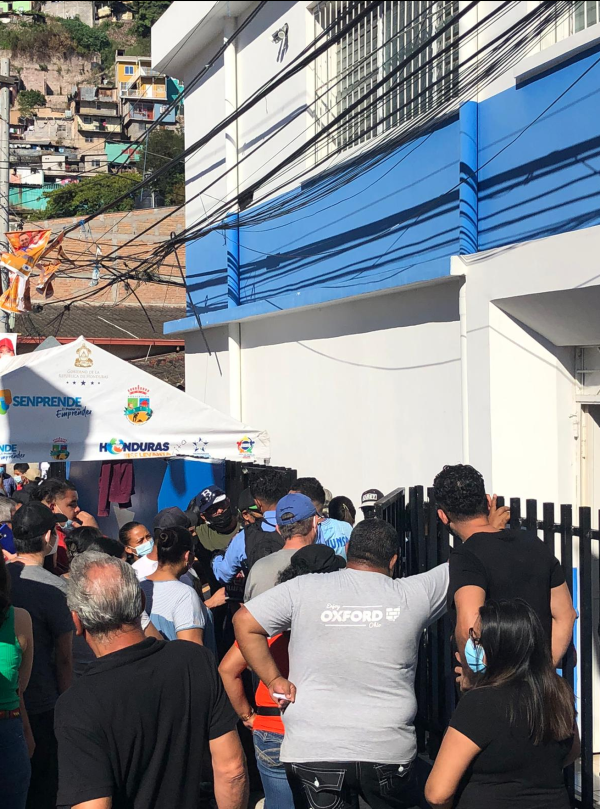
3:41 P.M. EST: An election observer documented very long lines outside a voting center in the Buenos Aires neighborhood of Tegucigalpa. “A woman in line told me that they had already been in line for two hours, and that the line isn’t moving at all. She has worked the polls before, and it’s never been like this.”
3:33 P.M. EST: An election observer in Lepaera, Lempira sent this photo from inside a voting center:
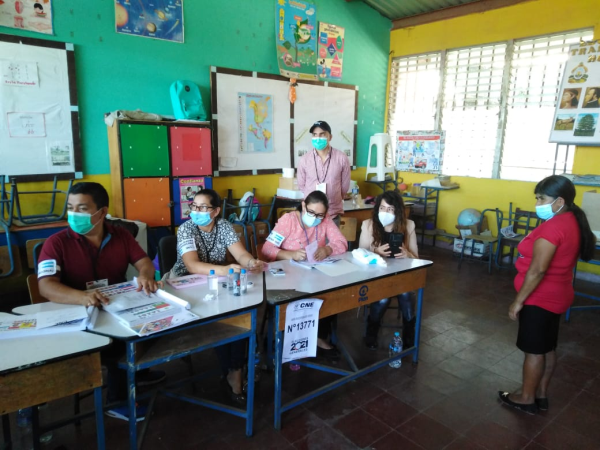
3:22 P.M. EST: Honduran media report that the voting center at the Fraternidad de Villanueva school finally received their technological kit at around 2:00 p.m. local time. Voting center workers had been trying to get the kits since 9:00 a.m. local time.
3:18 P.M. EST: Independent media organization Report Without Fear notes that some voting table supervisors in San Pedro Sula are not stamping ballots prior to depositing them.
3:01 P.M. EST: An election observer documented a lull in voting at Monseñor Cáceres at 2:37 P.M. EST.
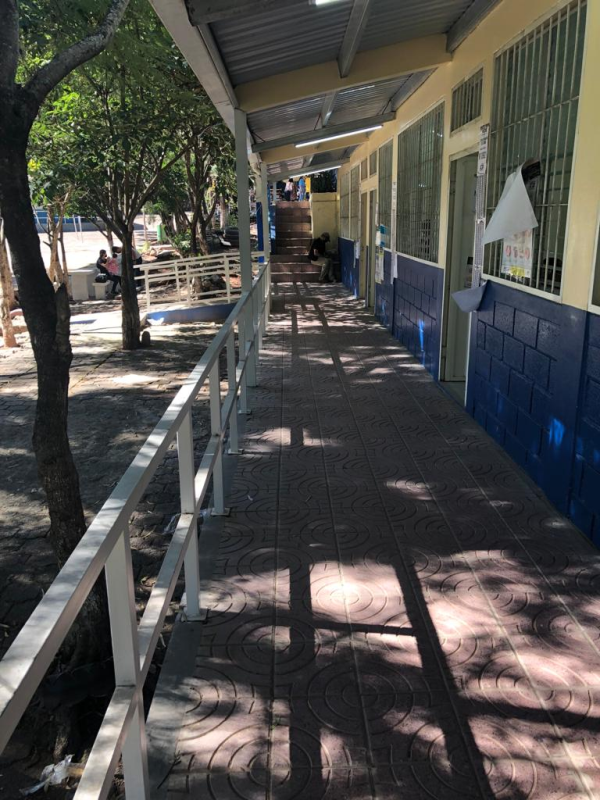
2:39 P.M. EST: Honduran TV network HCH broadcast a press conference by governing National Party representatives declaring victory, some four hours before voting centers close. This has drawn condemnation from the Progressive International, among others, who see it as an “effort to disinform voters, dissuade participation, and endanger democracy in Honduras.” EU Electoral Observation Mission head Željana Zovko has expressed concern about political parties claiming victory already.
2:19 P.M. EST: Right-wing newspaper site La Tribuna posted an article earlier citing the defense secretary as claiming that the armed forces delivered election materials to “each designated place,” “even in the most remote areas of the country,” But numerous election observer and media reports have shown that this is not true.
2:12 P.M. EST: The CNE census site, which voters rely on to find out their voting location, continues to be offline, drawing complaints and condemnation.
1:44 P.M. EST: The PJE and CESPAD have issued a new alert about election irregularities, including that “at least 17 Voting Table Supervisory Groups” in 5 departments did not receive their technological kits to process votes, that some Voting Table Supervisory Groups do not have equipment to collect fingerprints, and that there are reports of party propaganda inside of 19 voting centers.
1:32 P.M. EST: El Pulso reports, with video, that armed forces closed a voting center in Tela, Atlántida, after a conflict broke out there.
1:28 P.M. EST: An election observer reports: “At a polling site in Tegucigalpa, a scuffle broke out amid complaints of people taking photos of their ballots in exchange for 5000 Lempiras.”
12:47 P.M. EST: Televicentro HN reported at 12 noon ET that voting kits had finally arrived in Choluteca and Siguatepeque, four hours after voting was supposed to have started.
12:43 P.M. EST: The PJE and CESPAD have issued an alert about election observers being hindered from entering a voting center: “In the Saúl Bueso Castañeda school, a voting center in the municipality of Santa Rita in the department of Copán, the secretary of the Municipal Electoral Council impeded the access of accredited observers of the Youth Electoral Platform into the voting center.”
12:39 P.M. EST: Peninsula 360 Press reports on vote buying, and delays. They interviewed Marco Castillo of Global Exchange, who told the outlet earlier, “We have been observing and, above all, what they are reporting to me is that the whole process is super delayed here in the Colón area…” He also told Peninsula 360 that yesterday they documented a federal government official wearing a cap promoting a National Party political candidate while making payments for a social program “in the same school” that is serving as a voting center today.
12:24 P.M. EST: Independent media outlet Contra Corriente reports that CESPAD’s Lucía Vijil has witnessed “political patronage” by the ruling National Party, with “state resources being used in voting centers, for example, to buy food in exchange for votes.”
12:17 P.M. EST: The Plataforma Juvenil Electoral (PJE), and CESPAD, which each have observers at various voting centers today, issued an alert that party representatives are instructing people how to vote at the Federico Padilla Rubi school in the town of Arenalitos, La Paz department.
12:02 P.M. EST: The International Honduran Diaspora has issued a statement denouncing that few national ID cards (DNI) have been delivered to Hondurans residing in the United States, “where more than 1 million compatriots live.” “Only 12,858 DNI enrollments were made and only 1,090 were delivered,” the group says, noting that consular offices also used the Thanksgiving holiday as an excuse to delay delivery.
The lack of ID cards among Hondurans abroad has been a major concern ahead of the election.
11:52 A.M. EST: An election observer reports: “A Partido Nacional team is ‘capturing’ votes outside Monseñor Cáceres school. Every time a voter comes to the school, they pick them by the arm and push them to their tent. At the tent they are recording their IDs, and voters get instructions. After voting, they receive a mug.”
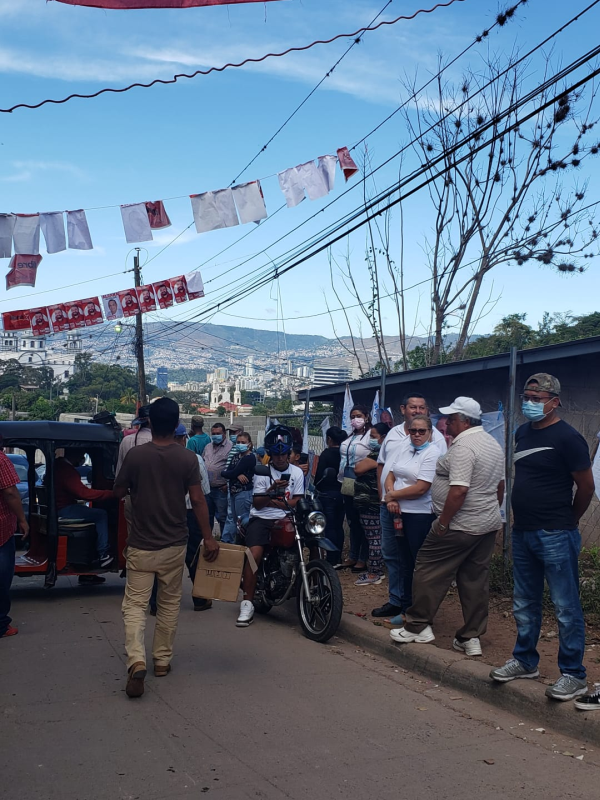
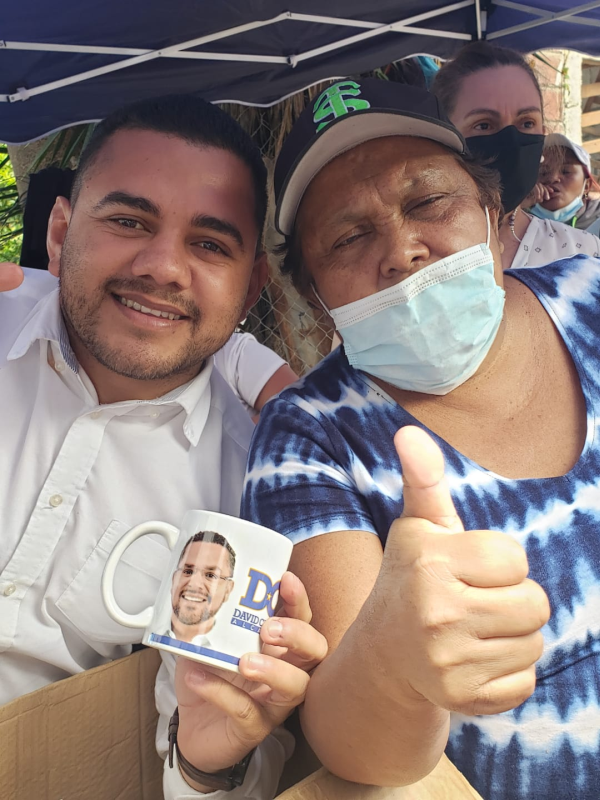
11:43 A.M. EST: How much will dissatisfaction with incumbent president Juan Orlando Hernández affect how people vote today? Much of US reporting on the elections stresses the scandals, corruption, and repression of the Hernández era, and the current government’s failures in improving the living standards of most Honduras, and in responding to the COVID-19 pandemic. For example, Jared Olson reports for the Los Angeles Times:
Hernandez has left the nation in ruins as tens of thousands of Hondurans flee for better lives in the U.S. and elsewhere. The president’s years in power have been marked by human rights violations, extrajudicial killings, stolen public money, poverty and complicity in drug trafficking at the highest levels of government.
…
“Juan Orlando is leaving us with a broken country,” said Lenín Laínez, a congressman for the opposition Libre party. “A country in debt, with serious narco-corruption, with high levels of criminality and one of the most unequal populations in Latin America.”
…
The National Party “has left us with a Honduras where it’s impossible to access quality, free healthcare or education,” said Anabel Melgar, a member of the National Front for Youth in Resistance. “They embezzled the health fund, and thousands of people have died because, with the money from the fund stolen, they handed out [poor-quality] pills.”
This graffiti in Tegucigalpa reflects anti-Hernández sentiment.
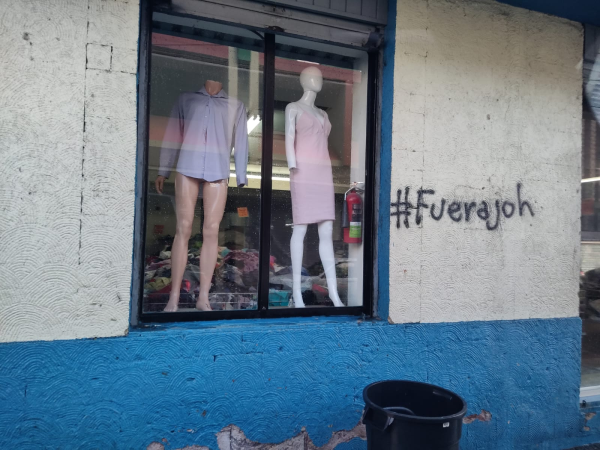
(Photo: Burke Bindbeutel)
11:07 A.M. EST: Various purported opinion polls, or images of supposed poll results, are already circulating. Observers caution to be wary of such purported polls, and numerous Honduran media outlets have committed to avoid reporting any such polls until after the CNE makes its first official announcement, which it is supposed to do after 8:00 p.m. Honduras time.
11:01 A.M. EST: Journalist José Luis Granados Ceja is documenting the situation in various voting centers today. These photos illustrate aspects of the voting process, from fingerprint scanning to depositing of ballots:
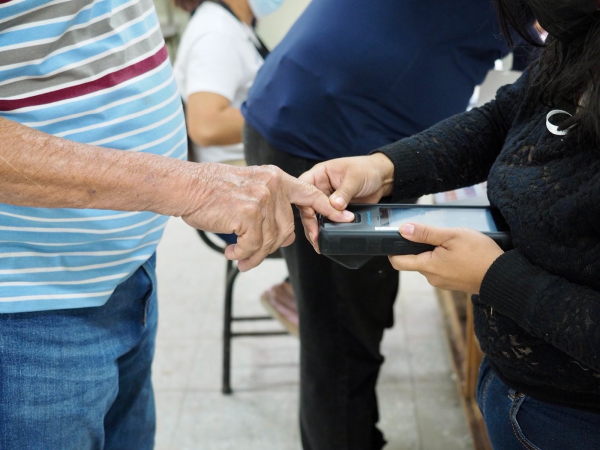
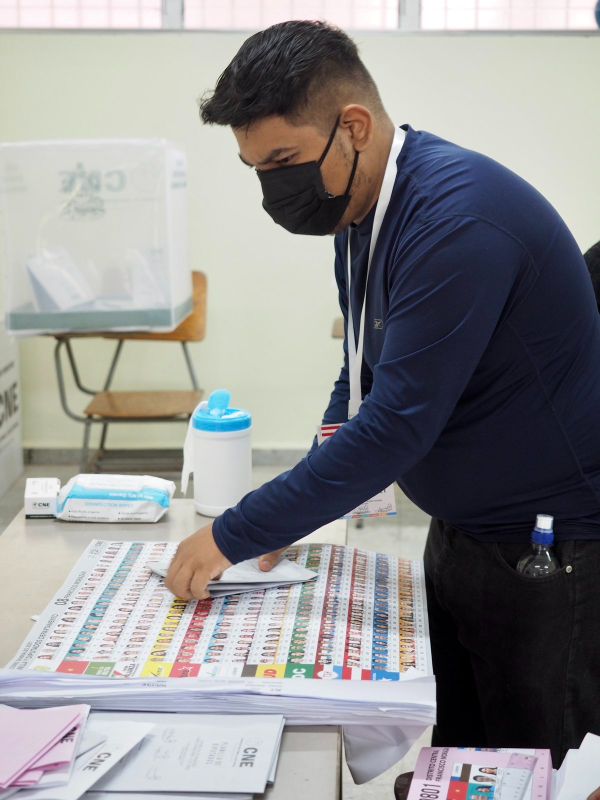
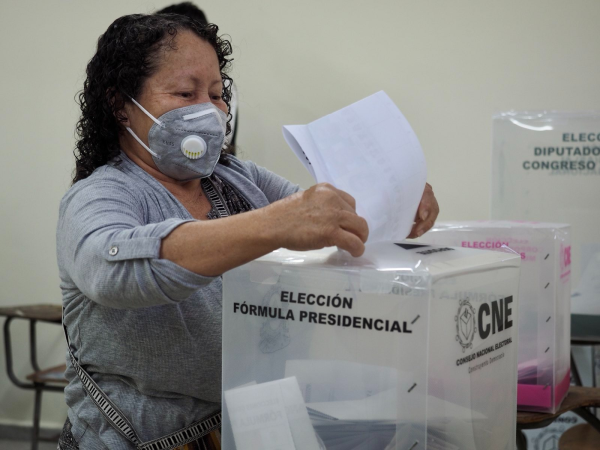
10:38 A.M. EST: An election observer reports: “The JRV [Voting Table Supervisory Group] where I am stationed [in Distrito Central, Francisco Morazán] opened late (8am instead of 7) because of a problem with the password for the fingerprint ID machine. Voting has been consistent and one of the JRV members told me that she has worked mesas before and it seems like more traffic than before.”
10:15 A.M. EST: The CNE census site is still offline, making it difficult for people to find out where they are supposed to vote, as Honduras Now (which also has a useful podcast episode providing background on this election) explains:
With a new ID card process, the final online voting census is crucial for voters to figure out what voting centers they are supposed to vote at but the CNE’s census website https://t.co/bOyeX5Zg3j has been down since at least 6:45 am #Honduras pic.twitter.com/rR4cskKIpk
— Honduras Now (@HondurasNow) November 28, 2021
9:51 A.M. EST: Honduran media report long lines at voting centers in Comayagüela (northwest of Tegucigalpa)
and at the Centro de Educación Básica Gubernamental Dr José Antonio Peraza de la colonia 6 de Mayo del sector Rivera Hernández in San Pedro Sula, where the voting center still had not opened as of 9:00 a.m. EST, an hour after voting was supposed to have started.
En el Centro de Educación Básica Gubernamental Dr José Antonio Peraza de la colonia 6 de Mayo del sector Rivera Hernández aún no abren los portones lo que está causando molestia entre los votantes que madrugaron para ejercer el sufragio. #EleccionesHonduras2021 pic.twitter.com/NtXKiwb56H
— Diario La Prensa (@DiarioLaPrensa) November 28, 2021
9:42 A.M. EST: Honduras’s major trade association, the Honduran Council of Private Enterprise (COHEP) issued a statement calling on the National Electoral Council (CNE) “to adhere to the constitutional framework, and perform rigorous and transparent work, which guarantees the legitimacy of this electoral process,” and urging “that all relevant information, is communicated in a clear, accurate and timely manner” by the CNE.
9:22 A.M. EST: A number of political candidates, including presidential candidate Xiomara Castro and vice presidential candidate Salvador Nasralla, are voting early. “We set the example of going out to vote early. Honduras needs a real change,” Castro told reporters.
9:13 A.M. EST: Honduran media are reporting late openings of some voting centers, in La Ceiba and la Villa Olímpica in Tegucigalpa where a voting center reportedly opened more than 40 minutes late. Meanwhile, the website of the National Electoral Council (CNE), one of the electoral institutions created as part of reforms following election-rigging in 2017, is experiencing problems.
8:59 A.M. EST: Election observers report “Lines at the polls, lots of excitement & lots difficulties with the system that will transmit preliminary results to the CNE center in Tegucigalpa (TREP).” Honduran media and foreign correspondents also are reporting long lines at polling places in some urban areas.
Today, November 28, Hondurans head to the polls for crucial elections amid escalating political violence across the country. Voters will be electing a new president, the entirety of the 128-seat National Congress, every mayor of the country’s 298 municipalities, and over 2000 municipal councilors, as well as 20 representatives to the Central American Parliament.
At the presidential level, the leading contenders are ruling National Party candidate Nasry “Tito” Asfura and Xiomara Castro of the Liberty and Refoundation Party (LIBRE). The most recent polling, from late October (Honduran law forbids polling within one month of scheduled elections) showed Castro with a significant lead over Asfura: 38 to 21 percent, with Liberal Party candidate Yani Rosenthal well behind both.
Honduras has experienced political violence in the run-up to the elections. The United Nations Office of the High Commissioner for Human Rights most recently cited 29 political killings. Recent high-profile assassinations include a Liberal Party mayor running for reelection, Francisco Gaitán, and Luis Casaña, a LIBRE Party candidate for municipal councilor who was shot shortly after leaving a campaign event with presidential candidate Xiomara Castro.
Electoral reforms negotiated after the 2017 elections and subsequent protests, but not approved until after party primaries in March of this year, have given rise to hope for a more transparent process. Crucial technical aspects of the electoral process, however — such as the newly implemented fingerprint identification system — are presenting serious challenges. This includes problems stemming from this year’s electoral census and the administration of new identification cards required for voting. According to reports, more than 350,000 Hondurans were still without these new ID cards as of mid-November, including many in the US. Already, the day before the elections, observers reported irregularities, including apparent vote-buying, voter intimidation, and failure the deliver materials and equipment needed to transmit vote results.
Also a product of the negotiated reforms is the highly political makeup of the National Electoral Council (CNE), whereby each of the three major parties has one voting member in the CNE. Given that the contenders for the presidency are from LIBRE and the National Party, the Liberal Party CNE councilor could act as a potential key swing vote on Sunday night, and after.
Yet many are expressing cautious optimism — including Gustavo Irías, executive director of Honduras’s Center for Democracy Studies (CESPAD) — that Sunday’s elections could signal a turning point following 12 years of crisis since the coup. In order to monitor conditions on the ground during the elections, CESPAD has partnered with US-based human rights organization Global Exchange to deploy dozens of international, and more than 250 national, observers to polling stations across the country.
Read this post for more background and context on Honduras’s 2021 elections.





